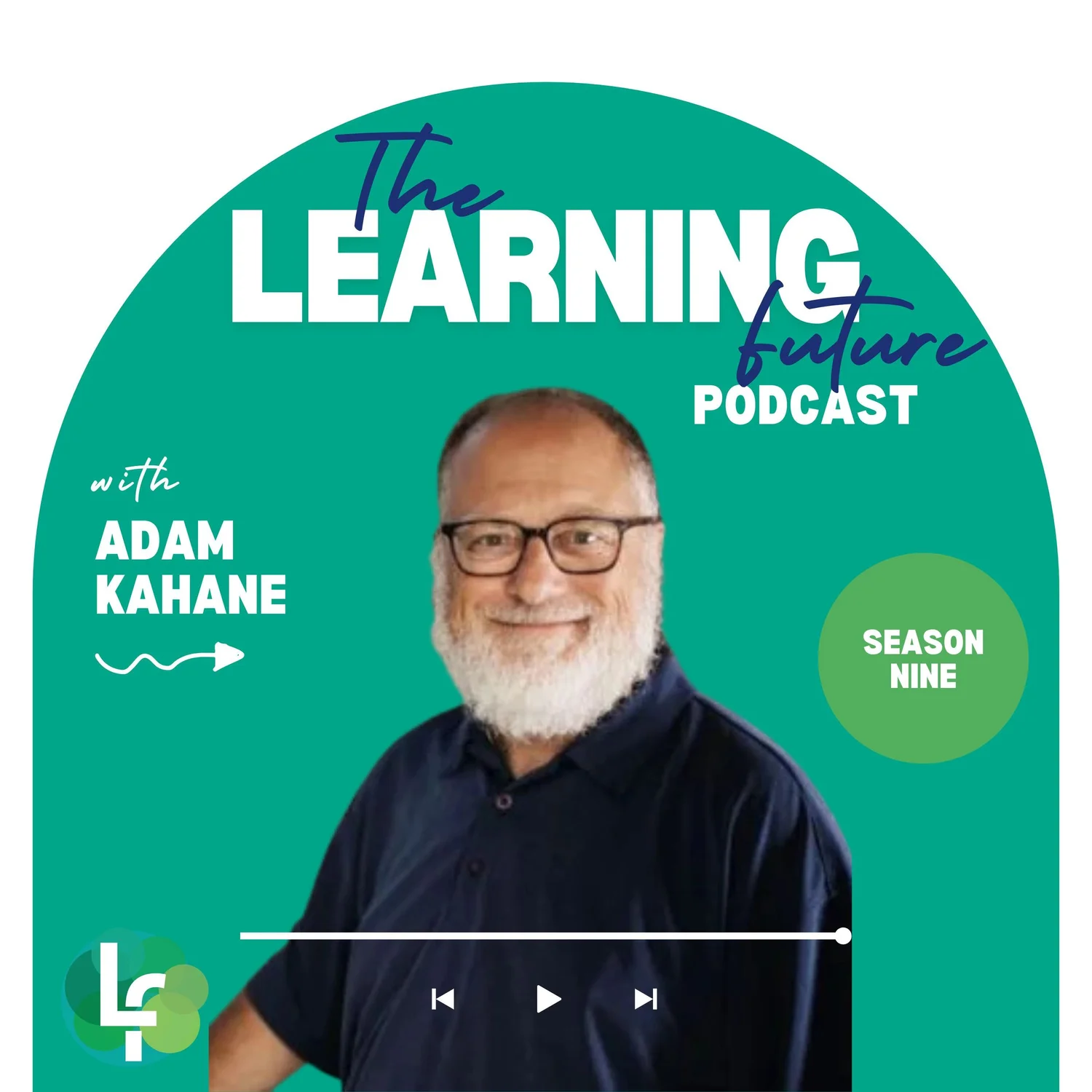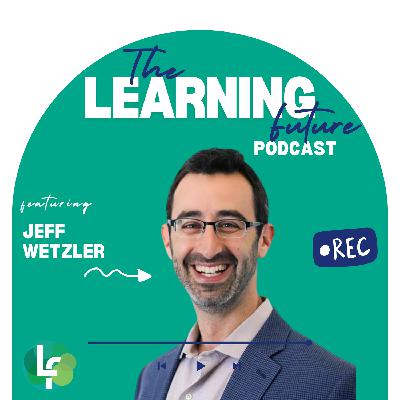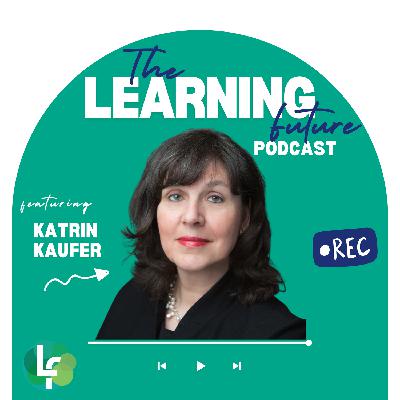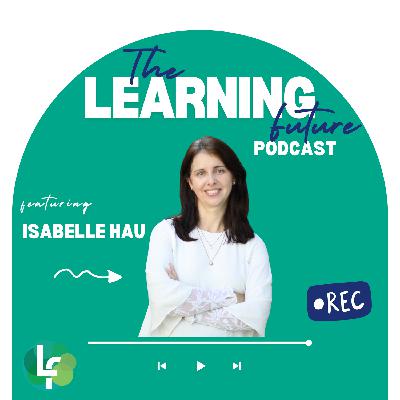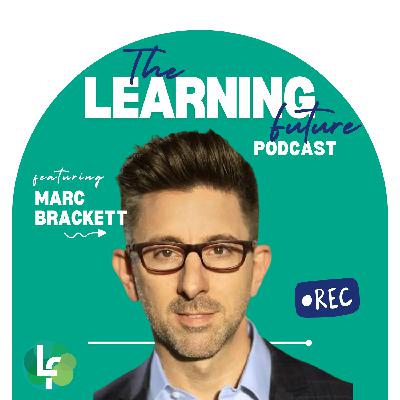Discover The Learning Future Podcast with Louka Parry
The Learning Future Podcast with Louka Parry

The Learning Future Podcast with Louka Parry
Author: The Learning Future
Subscribed: 29Played: 572Subscribe
Share
© The Learning Future Pty Ltd (Australia)
Description
The world has never been changing more rapidly, dislocating the ways we work, learn and live. On The Learning Future Podcast we discuss the knowledge, skills and dispositions we all need for our learning future, exploring insights through interviews with world-class educators, researchers, policy makers, and leaders from across industries and across the world.
139 Episodes
Reverse
In this episode of the Learning Future podcast, Louka Parry interviews Dr. Anne Knock, a leading figure in educational strategy and design. They discuss the importance of strategic design in education, the role of complexity theory, and the need for schools to adapt to a rapidly changing world. Dr. Knock shares insights from her book, 'School by Design,' emphasizing the shift from traditional classroom models to more dynamic learning ecosystems. The conversation also explores the significance of leadership, values, and practical tools in transforming educational environments for the benefit of students.
In this episode of the Learning Future Podcast, host Louka Parry engages with two Year 11 students, Flynn Thomas and Chelsea Cox, from Hunter Valley Grammar School. They discuss their experiences in education, focusing on themes such as adaptability, time management, the importance of wellbeing, and the role of relational connections in teaching. The conversation also explores student agency, the value of skills over academic scores, and the impact of technology and social media on young people's lives. Flynn and Chelsea share their insights on navigating career pathways and the evolving landscape of education, emphasizing the need for a learning mindset in an unpredictable future.
In this episode, Louka Parry sits down with Dr Annalies Corbin, founder and CEO of the PAST Foundation, for a powerful conversation about reimagining the purpose and practice of education. Together they explore how schools can evolve from isolated, subject-bound institutions into dynamic learning ecosystems that connect curiosity, community and real-world problem-solving.Dr Corbin shares insights from 25 years of innovation — from honouring student passions and recognising learning beyond the classroom, to supporting teachers in showing up authentically and reigniting their own love of learning. She discusses the importance of micro-credentialing, the future of STEM, and what it takes to design learning experiences that truly link learning to life.A compelling conversation for anyone passionate about transforming education, empowering young people, and imagining what’s possible when we start with curiosity and say “yes” to new ways of learning.
In this episode of the Learning Future podcast, host Louka Parry engages with futurists Jamais Cascio and Bob Johansen to explore the complexities of navigating the current chaotic landscape, framed by the BANI model. They discuss their personal learning experiences, the implications of technology on human development, and the importance of mentorship across generations. The conversation emphasizes the need for clarity in uncertain times and the role of education in fostering resilience and adaptability in students.
In this engaging conversation, Louka Parry, Tessa Forshaw, and Rich Braden explore the intersection of education, innovation, and cognitive science. They discuss the importance of mindsets in fostering creativity, the role of AI in learning, and the necessity of navigating ambiguity in educational environments. The speakers emphasize that innovation is not merely a process but a mindset that can be cultivated through intentional practice. They also reflect on the changing landscape of education, the impact of technology, and the need for learners to develop metacognitive skills to thrive in a rapidly evolving world.
In this episode of the Learning Future Podcast, Louka Parry speaks with Kevin Stoller, co-founder and CEO of K12, about the evolving landscape of education. They discuss the need for a shift from traditional educational models to more student-centered approaches that prioritize authentic learning experiences. Kevin shares insights on the importance of creating engaging learning environments, the role of agency in education, and the necessity of innovation in teaching practices. The conversation also touches on global perspectives on education, the significance of data in driving educational success, and the vision for a future where students are empowered to take ownership of their learning.
In this conversation, Louka Parry and Dr Amie Fabry explore the critical themes of hope, agency, and the holistic development of children in education. They discuss the importance of play, emotional intelligence, and the need for collaboration among educators, families, and communities to create a nurturing environment for children. The conversation emphasizes the need to focus on the whole child and the profound impact of early childhood education on lifelong learning and development.
In this enlightening conversation, Louka Parry and Peter Hayward explore the realms of foresight and future studies, emphasizing the importance of personal transformation, the role of Stoicism, and the evolving landscape of education. They discuss how engaging with the future involves understanding our fears and hopes, the significance of endings, and the need for new institutions that prioritize human connection and critical thinking. The dialogue encourages listeners to embrace the future with courage and creativity, recognizing the potential for growth and change.
In this episode of the Learning Future podcast, Louka Parry speaks with Michelle Culver, founder of the Rhythm Project, about the intersection of education, AI, and human connection. They discuss the importance of learning from young people, the role of relationships in education, and how AI can both enhance and challenge human connections. Michelle shares insights on creating conditions for aliveness in learning environments and emphasizes the need for collective imagination in shaping the future of education.
In this deeply moving and expansive episode, Louka Parry is joined by Luis Alberto Camargo, founder of OpEPA and leading voice in nature-based education, to explore what it means to learn as nature, not just about it. Together, they delve into how education systems can move from knowledge transmission to relational, regenerative learning that reawakens our connection to self, others, and the living Earth.Luis shares a vision of education rooted in wonder, silence, and interbeing—where schools become ecosystems, teachers become guides, and learning is life itself. He also challenges the dominant economic narrative, offering instead a pluriversal, multi-capital framework that values vitality, culture, and the health of bioregions.If we realign purpose across education, economics, and community, what might be possible in 10 years? Luis offers a hopeful—and urgent—invitation to remember who we are, reweave our relations, and act in service of life.
In this powerful and timely conversation, Louka Parry is joined by Sarah Davies, CEO of the Alannah & Madeline Foundation and Dolly’s Dream, to explore how technology, power, and purpose intersect in the lives of young people. Together, they confront the hidden harms of data extraction, dark patterns, and wellbeing bots, while also spotlighting the enduring resilience of childhood. From the dangers of cognitive offloading to the urgent need for data privacy reform, this episode challenges listeners to reclaim agency—as parents, educators, and citizens—and protect the relational heart of childhood in a rapidly digitising world.
In this rich and expansive conversation, Professor Martin Westwell, Chief Executive of the South Australian Department for Education, joins Louka Parry to explore the deep shifts required in education to truly prepare young people for the complexity of today’s world. From the role of dispositions and student agency to the transformational potential of generative AI in classrooms, the dialogue challenges dichotomous thinking and calls for a purpose-driven, flexible, and learning-focused education system. Together, they unpack what it means to shift from achiever to explorer and build a system where students thrive—not just perform.
If the goal of education is to prepare students for the future, why are we not teaching them explicitly about the future?In an age of rapid change and uncertainty, what might education look like if imagination was treated as essential as literacy or numeracy?🎙️ Episode SummaryIn this episode of The Learning Future Podcast, host Louka Parry speaks with Dr. Peter C. Bishop, executive director of Teach the Future and retired professor of strategic foresight from the University of Houston. Together, they explore why futures thinking is not only possible but essential in education. Dr. Bishop challenges conventional education models that overemphasize empirical certainty and neglect imagination, agency, and the capacity to navigate uncertainty. With stories from global classrooms and reflections on decades of foresight education, this episode is a compelling call to reimagine schooling as a place of skills-based learning, deep engagement, and preparation for an unpredictable future.👤 About Dr. Peter BishopDr. Peter C. Bishop is a leading futurist, educator, and executive director of Teach the Future, a global movement promoting futures thinking in education. He served as Associate Professor of Strategic Foresight and Director of the Graduate Program in Foresight at the University of Houston until his retirement in 2013. A passionate advocate for futures literacy, Dr. Bishop has authored key texts including Thinking About the Future and Teaching About the Future (with Andy Hines). His work focuses on helping educators and students develop the mindset and tools to navigate uncertainty, embrace imagination, and become agents of change in their own communities.
What if peaceful system transformation isn’t led from the top, but from within — through the everyday choices of those embedded in the system?In a world craving certainty, how might we learn to embrace dissonance and cracks as the starting points of meaningful change?Episode SummaryIn this episode of The Learning Future Podcast, Louka Parry speaks with renowned systems thinker and facilitator Adam Kahane, author of Everyday Habits for Transforming Systems. Drawing on more than 30 years of global experience—including his involvement in South Africa’s democratic transition—Adam explores how radical engagement and individual agency contribute to peaceful system transformation. Together, Louka and Adam unpack the hidden grammars of schooling, the pitfalls of top-down reform, and the power of everyday habits to drive sustainable change. From Leonard Cohen to the Bhagavad Gita, this conversation is a deep and practical exploration of how we might lead with love and power in a time of profound flux.About Adam KahaneAdam Kahane has more than 30 years of experience in more than 50 countries working with thousands of leaders to transform social systems at all scales (organization, city, country, globe). His work has addressed many of the most important challenges of our time, including racial oppression, violent conflict among warring groups in countries, insecurity and inequity, drug problems, social unrest, unsustainable food systems, and climate change. Kahane is a bestselling author whose five previous books each have sold between 20,000 and 100,000 copies: Solving Tough Problems, Power and Love, Transformative Scenario Planning, Collaborating with the Enemy, and Facilitating Breakthrough. He is the director of Reos Partners, an international social enterprise that helps people move forward together on their most important and intractable issues.
What are we at risk of losing in our pursuit of efficiency, innovation, and AI-driven transformation in education?Are we designing systems for resilience—or are we unintentionally reinforcing inequality through the paths of least resistance?In this insightful conversation, Louka Parry is joined by Tracey Burns—Chief of Global Strategy and Research at the National Center on Education and the Economy, former OECD leader, and international systems thinker. Speaking from Paris, Tracey draws on her global experience to explore how education systems are evolving—and what we risk losing in the process.Together they dive into the accelerating impact of AI, the legacy of the OECD’s Four Future Scenarios for Schooling, and the urgent need for wisdom, not just innovation, in navigating complexity. From learning models to system inefficiencies, Tracey unpacks why we must be more intentional in preserving what matters—especially the deeply human relationships at the heart of learning. This episode is a call to anticipate, adapt, and interrogate the uncomfortable truths shaping our futures.
What if the key to transformative leadership lies not in having answers, but in asking the right questions?How can embracing curiosity over certainty revolutionize our approach to education and organizational growth?In this episode, Jeff Wetzler delves into the transformative power of asking questions and how it can unlock hidden wisdom within organizations and educational systems. He introduces the “Ask Approach,” a five-step method designed to foster deeper understanding and innovation by tapping into the insights of those around us. Jeff shares personal anecdotes and professional experiences that highlight the importance of curiosity, psychological safety, and active listening in leadership and learning. Listeners will gain practical tools to enhance their decision-making processes, build stronger relationships, and drive meaningful change in their communities.Jeff Wetzler is an expert in learning and human potential, with over 25 years of experience spanning business and education. He is the co-founder and former co-CEO of Transcend, a nonprofit organization dedicated to transforming learning environments through human-centered design and innovation. Prior to Transcend, Jeff served as Chief Learning Officer at Teach For America and worked as a management consultant at Monitor Group, advising Fortune 500 companies. He holds a Doctorate in Adult Learning and Leadership from Columbia University and a Bachelor’s in Psychology from Brown University. Jeff is also the author of Ask: Tap Into the Hidden Wisdom of People Around You for Unexpected Breakthroughs in Leadership and Life. Share your thoughts with us on social media or visit our website www.thelearningfuture.com.
📘 Episode Summary:In this deeply thoughtful episode of The Learning Future Podcast, Louka Parry is joined by Dr. Katrin Kaeufer—author, educator, and co-founder of the Presencing Institute at MIT. Together, they explore how the emerging future can shape our present actions through the practice of presencing, a method that integrates mindfulness, leadership, and systems change.Katrin shares personal reflections on stepping into novicehood, how embodiment reshaped her approach to teaching, and why reclaiming our attention is the defining challenge of our time. The conversation navigates the shift from ego- to ecosystem-thinking in economics, education, and leadership, and invites listeners to imagine regenerative futures through practices that deepen awareness and foster relational trust.Whether you’re an educator, changemaker, or systems leader, this episode offers insight into the practices and paradigms that are shaping the future of learning, work, and social transformation.About Katrin Kaufer:Katrin Kaufer leads the Just Money Program at MIT’s Department of Urban Studies and Planning (CoLab) and is Managing Director of the Presencing Institute. Her research and teaching focuses on leadership, organizational change, finance and participatory action research. She founded the Leadership Academy of Global Alliance for Banking on Values (gabv.org). Recent publications include: in 2025 „Presencing. 7 Practices for Transforming Self, Society and Business“ co-authored with Otto Scharmer and in 2013 Leading from the emerging Future (Berrett-Koehler Publishing); in 2021 Just Money. Mission-based banking and the future of finance. (MIT Press). Katrin holds a doctoral degree from University Witten/Herdecke, Germany.🔗 Resources mentioned:- Presencing Institute- Presencing: Seven Practices for Transforming Self, Society, and Business- MIT CoLabFollow Louka Parry:- LinkedInTune in to be inspired, challenged, and reminded why love truly is at the heart of learning.Share your thoughts with us on social media or visit our website www.thelearningfuture.com.
How might we design AI not just to personalize learning, but to truly make it personal, enabling each learner to discover and design their own purpose? What would professional development look like if it mirrored the learning experiences we aspire to give young people—human-centered, delightful, and deeply relevant? In this rich and forward-looking conversation on The Learning Future Podcast, host Louka Parry is joined by Sunanna Chand, Executive Director of the Reinvention Lab at Teach For America. Together, they explore the future of learning, focusing on how artificial intelligence (AI), human-centered design, and learning ecosystems can unlock new educational possibilities. Sunanna shares insights into Future Shock, a project-based program that equips young people with the skills to design their own futures—combining interest-based learning with strategic uses of AI. She also reflects on the need to design professional learning for educators with the same joy, relevance, and depth we desire for students. The conversation touches on AI’s potential as both a partner and a risk, advocating for technology that enhances human connection rather than replacing it. Together, Louka and Sunanna unpack how we might move from standardized education to personalized, purpose-driven learning while acknowledging the real constraints educators face. They stress the power of networks, radical imagination, and equitable design in reshaping learning for the 21st century. About Sunanna Chand: Sunanna Chand is the Executive Director of the Reinvention Lab at Teach For America, where she leads future-focused R&D efforts to reshape education through design, equity, and innovation. With a background spanning learning ecosystems, human-centered design, and system transformation, she previously led Remake Learning, fostering district-level change through powerful cross-sector networks. A passionate advocate for learner agency and equity, Sunanna explores how tools like AI can support—not supplant—human connection in education. She is a national voice for reimagining what high-quality, personal, and purposeful learning can look like for all young people. Stay Connected with Sunanna Chand: LinkedIn: https://www.linkedin.com/in/sunannachand/ Learn more about the Reinvention Lab: reinventionlab.org Stay Connected with Louka Parry: For the latest learning innovation follow Louka on LinkedIn: https://www.linkedin.com/in/loukaparry/ Share your thoughts by visiting www.thelearningfuture.com Tune in to be inspired, challenged, and reminded why love truly is at the heart of learning.Tune in to be inspired, challenged, and reminded why love truly is at the heart of learning.Share your thoughts with us on social media or visit our website www.thelearningfuture.com.
What if we designed our education systems around relationships instead of outcomes—what would change in how we measure success?As AI rapidly integrates into learning environments, how do we safeguard and elevate the irreplaceable value of human connection in a child’s development?In this thought-provoking episode of The Learning Future Podcast, host Louka Parry is joined by Isabelle Hau, Executive Director of the Stanford Accelerator for Learning and author of Love to Learn: The Transformative Power of Care and Connection in Early Education. Together, they explore why relationships must be placed at the center of learning systems—from the neuroscience of early childhood development to the role of love, play, and human connection in lifelong learning.Isabelle shares powerful insights from her research, including the impact of nurturing relationships on brain development, the hidden costs of technology-induced disconnection, and the decline of free play in childhood. They also discuss the promises and perils of AI in education—highlighting its potential to either enhance or erode our relational capacities depending on how it’s designed and used.Whether you’re an educator, policymaker, or parent, this episode offers a compelling call to action: to reimagine learning as a relational, joyful, and deeply human experience.Resources mentioned:- Love to Learn by Isabelle Hau- Research on the Romanian orphanages and brain development- The Stanford study on AI companionship- Tool for Observing Play Outdoors (TOPO)Tune in to be inspired, challenged, and reminded why love truly is at the heart of learning.Share your thoughts with us on social media or visit our website www.thelearningfuture.com.
What if Emotional Intelligence Was as Essential as Math? Are We Truly Preparing our peers to Lead with Emotional Intelligence?In this special episode of The Learning Future Podcast, host Louka Parry welcomes back the podcast’s inaugural guest, Professor Marc Brackett, a global authority on emotional intelligence and founder of Yale University’s Center for Emotional Intelligence. They dive deep into the significance of emotional education, reflecting on how far the field has come and the challenges that lie ahead in embedding emotional intelligence into schools, workplaces, and communities.Marc shares personal stories, research insights, and practical strategies to build emotional intelligence systems, such as the RULER framework. Together, they explore questions like why emotions matter more than ever in today’s world, the importance of implementation in education reform, and how to create environments where people feel truly cared for.What You’ll Learn: • The origins and evolution of the RULER emotional intelligence framework. • Why emotional intelligence is a necessity, not a luxury, for navigating life’s challenges. • How to create emotionally intelligent schools and workplaces. • The critical role of adult emotional education in shaping young minds. • Marc’s reflections on technology’s impact on emotional health and practical strategies to address it. • Inspiring stories about how emotional intelligence transforms communities.Key Quotes: • “Every child deserves one adult who is irrationally crazy about them.” – Uri Bronfenbrenner, shared by Marc. • “Emotions aren’t gendered—they’re what make us human.” • “It’s not about fixing people; it’s about creating environments where they feel seen and heard.”About Marc Brackett:Marc Brackett is the founding director of the Yale Center for Emotional Intelligence, a professor at Yale University, and author of the bestselling book Permission to Feel. His work focuses on integrating emotional intelligence into education systems and organizations to improve outcomes for children and adults worldwide.Resources Mentioned: • RULER Framework for Emotional Intelligence • Book: Permission to Feel by Marc Brackett • Studies on social-emotional learning and their impactJoin the Conversation:What resonated most with you about emotional intelligence and its role in education and life? Share your thoughts with us on social media or visit our website www.thelearningfuture.com.















